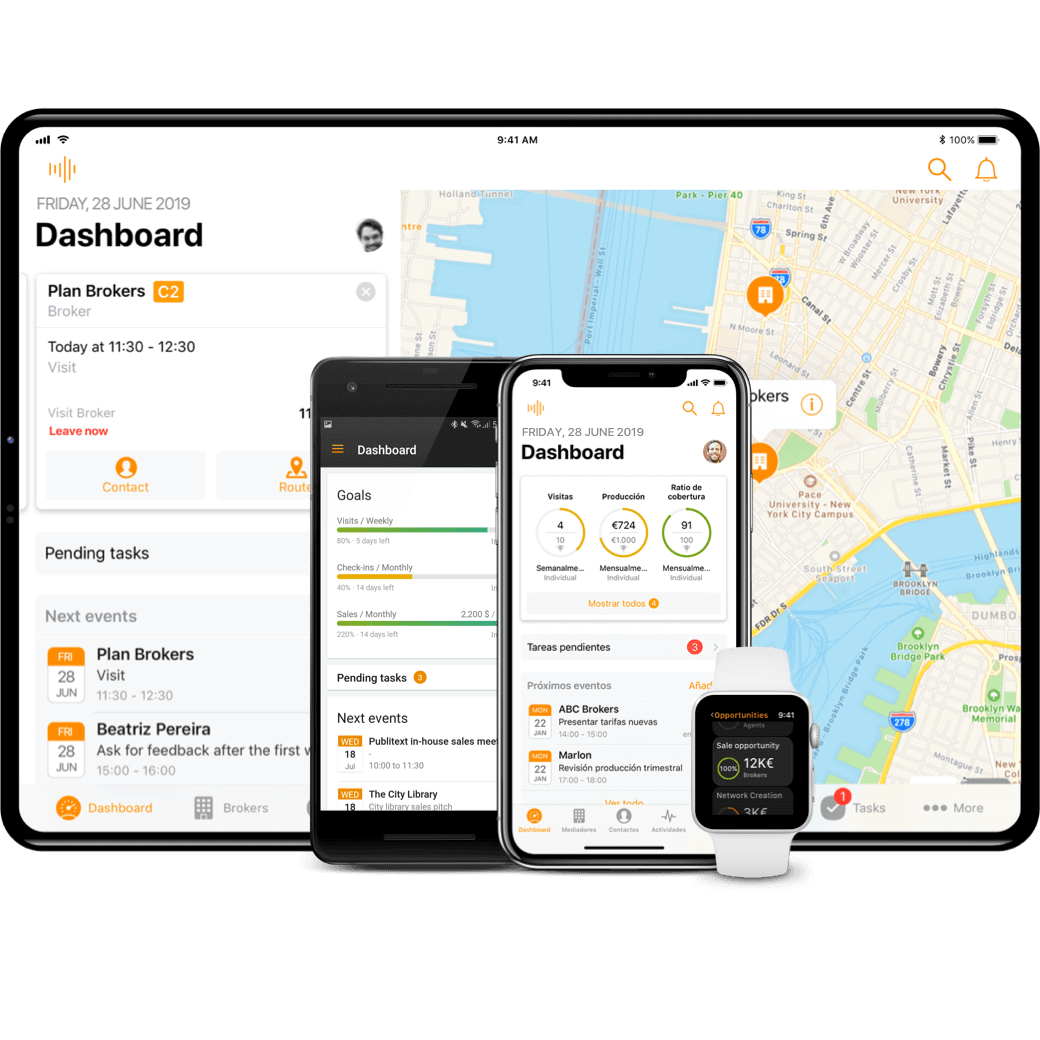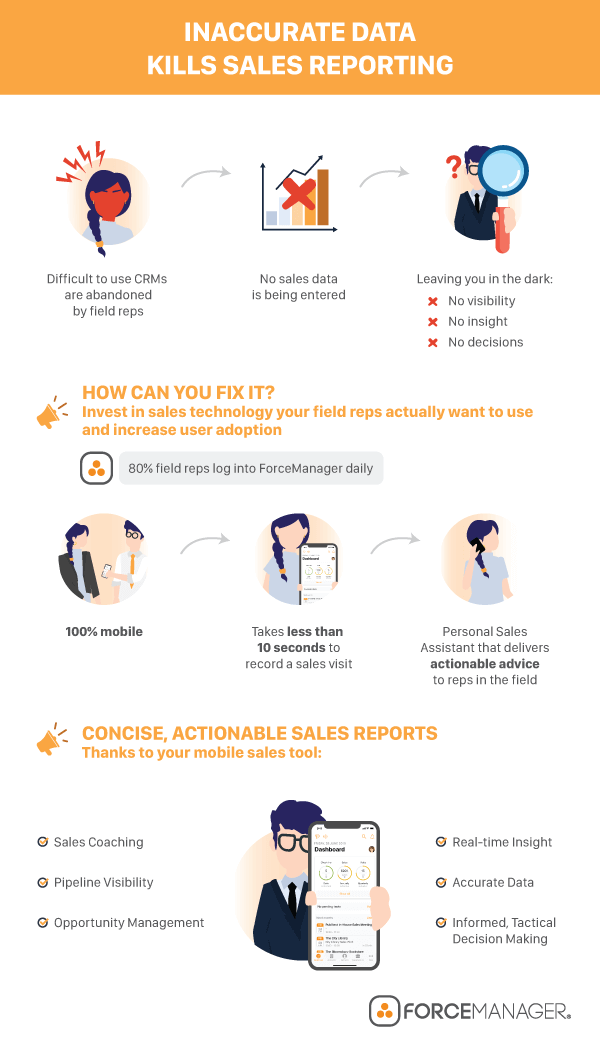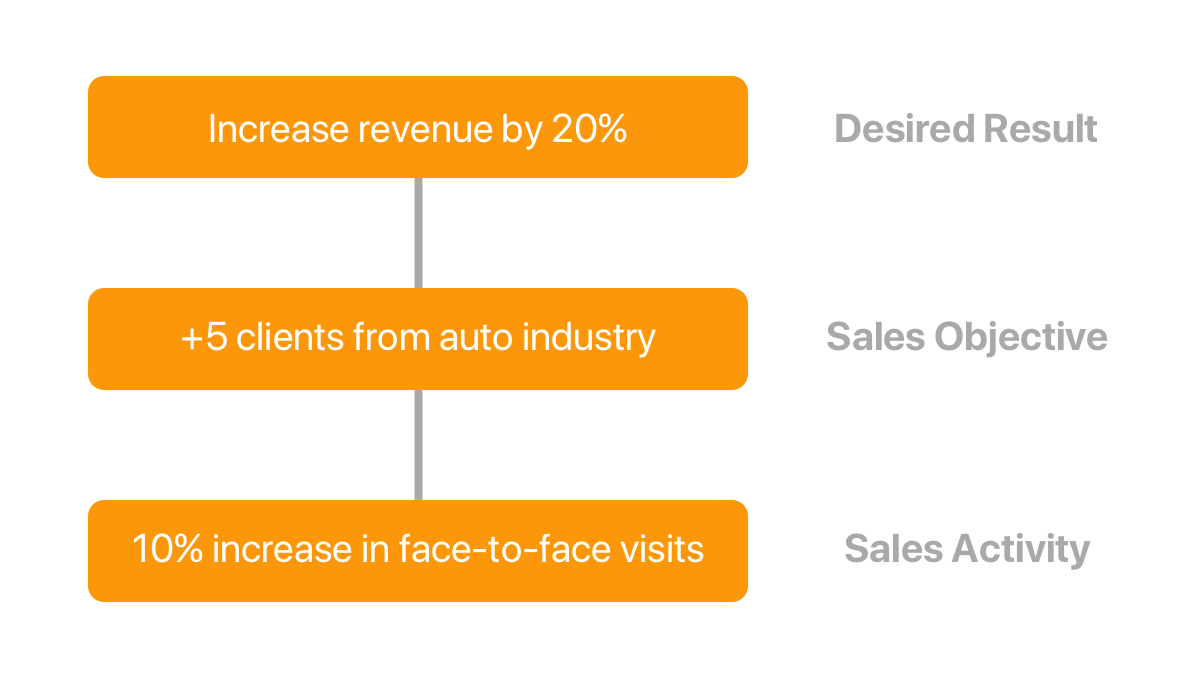Product
Features
column
column
Add-ons
Integrate
Custom Versions
Customers
By Industry
By Role
Success Stories
column
column
Pricing
Resources
Product Support
Education Resources
section
8 min read
Download a Sage Sales Management CRM Free-Trial version
CRM software for high-performance sales teams
Over the past couple of decades, the sales world underwent a digital transformation makeover as technological advancements in areas such as finance, HR and marketing eventually spilled over to the sales floor. Sales directors and managers now have access to an array of fancy reports, forecasts and AI data analysis to aid in their decision-making process. However, despite all these advancements; can we truly say there’s been much in the way of specifically-designed software for sales reps?
Most sales software is designed for leaders, the people responsible for building teams, predicting revenue and reporting to upper management. The front-line users are an afterthought.
Important questions such as: how are they going to use it? Is the user experience (UX) feedback being implemented into the technology’s design? Will it help them sell faster? Will it help them sell more efficiently? Are often omitted from discussion.
This is a real oversight considering salespeople are the ones using it daily and dangerous for management who rely on it for tracking their sales processes.
The good news is a few providers are looking at software for sale reps, who understand the important role they play in the overall success and implementation of their technology.
The principle software for sales reps is sales force automation technology (SFA).
Sales force automation technology or SFA alludes to any suite of programming applications that streamline the business management process. Some common features include tracking prospects and leads, sales team activity, client movement and correspondence as well as individual sales rep assessment.
Basically, SFA technology makes the lives of both the sales rep and director simpler via the automation of everyday tasks they’ve come to detest such as:
These administrative tasks tie sales reps up for hours on end, draining time that could be better spent on sales-driving activities. The role of sales rep software is to alleviate as much of this administrative work as possible.
AI in sales is typically associated with deep-dive data analysis and uncovering insights. However, what remains a little more unknown is how AI technology is used to help the frontline field sales rep.
Personal sales assistant applications such as Sage Sales Management’s Cognitive use natural language processing (NLP) to communicate with field reps through their mobile CRM, much like Apple’s Siri or Amazon’s Alexa.
Field reps can record sales visit data in a matter of seconds just by speaking to the application. They can also communicate safely with the sales rep software while driving, further utilizing the lost time between visits:
As you can see, field reps can as Cognitive to pull up information regarding an upcoming visit, to summarize what was discussed previously and even call ahead to let the client know you’re running late – much more efficient use of a salesperson’s time between calls.
Another important feature of sale rep software is geolocation technology.
Now before we get started I should make one thing clear – this is not a sales rep tracking software. Managers won’t be able to pull up a map of their sales territories and watch in real-time as their reps move around like pieces on a chessboard.
That’s frankly a little creepy and will have your sales team heading to the exit…
What geolocation technology actually does is assist with the daily route planning and contextual information delivered to a salesperson’s SFA or CRM dashboard.
 For example, by using the rep’s real-time location the software detects any close-by accounts or opportunities and highlights recent issues or correspondence they had with the company. This information is pulled up discreetly to the SFA’s dashboard meaning reps don’t waste time foraging around the system trying to find it.
For example, by using the rep’s real-time location the software detects any close-by accounts or opportunities and highlights recent issues or correspondence they had with the company. This information is pulled up discreetly to the SFA’s dashboard meaning reps don’t waste time foraging around the system trying to find it.
It’s little subtleties like this that have a major effect on shortening the sales cycle and increasing the efficiency of reps working out of the office.
Customer relationship management software (CRM) is typically thought of as a sales management software. It gives the director’s an encompassing view of their entire sales process, pipeline, funnel and general activity of their sales force.
However, it also has its positives for the frontline user.
Traditionally, sales reps would force a prospect down the sales pipeline according to a preconceived sales process. This would be mandated by the sales manager, often with little thought of the needs and signals coming from the prospective buyer.
The same process is used again and again regardless of who is at the end of the phone.
However, this is also where CRM comes into play.
If sales management grasps the fact that the stages of a sales opportunity should not be driven by the action a salesperson take but that of the prospective buyer or lead:
Has the lead confirmed they have the pain points your product/solution solve? Did they confirm that they currently have the budget to purchase? Did they confirm they have the authority to make a purchasing decision?
Asking these types of questions are much better sales pipeline management best practices as they help align the customer buyer journey with sales rep activity.
This way the sales rep and prospective buyers are always on the same page. Sales rep software can then come in and provide assistance by recommending certain actions depending on the situation to help accelerate the process and shorten the sales cycle.
For example, if you are an insurance agent or broker looking to upsell a new policy to a client, what sales collateral could they forward on relevant to the client’s current situation? What approaches have worked well in the past when upselling to clients of a similar profile? Are they any case studies that could be discussed next time the field rep schedules a face-to-face visit?
A CRM working in tandem with a customer-centric sales process can provide reps with that little extra contextual information to help shorten the sales cycle, strengthen customer relationships and close more deals.
As a sales manager, I’m sure you’ve been the victim of a nightmarish CRM implementation.
Initial calls with the provider were extremely positive; they offered you AI-enriched data analysis, forecasting capabilities beyond your wildest dreams. They even managed to get the IT team onboard…
However, despite all these promises things just didn’t work out. The software never gained traction with the rest of the team and was quickly abandoned, gathering digital dust at the back of your laptop somewhere…and I can guess why.
I’m going to bet that before you made any purchasing decisions regarding your SFA or CRM software you failed to ask this one question:
Are the field reps going to use it?
Because if they don’t it matters little which analytics and forecasting capabilities the CRM has – without the data being entered in the first place it’s got nothing to work with.
As the team lead you wouldn’t dream of denying your salespeople access to your CRM, right?
Be that as it may, by not giving your field team a versatile, mobile application you are seriously hampering their capacity to work effectively when working outside the office.
You can’t expect your sales team to recall each and every detail of their last visit, store that information to memory, call-in on a couple of clients before driving back to the office or closest coffee shop with WIFI to upload it to the desktop CRM.
It’s just simply not feasible, which is why mobile CRM apps have such an advantage when it comes to their traditional counterparts.
Not only can they update the CRM as soon as a meeting has concluded, meaning the data entered is fresh and done so in real-time, but also catch-up with what was discussed during their previous visit. This helps with their preparation and shows the client they’ve taken a genuine interest in their situation.
Another benefit of mobile software for sales reps is that reps have access to sales collateral when talking directly with a client. This could be in the form of a sales deck, pricing options, stock orders, etc. It’s the small details like this which make the life of the field rep that much easier.
One way to ensure your sales reps software gains traction with the team is to take a closer look at its usability.
Is the sales application easy to navigate? Is the key information my team needs easily located from the home screen? How long does it take to record information within the application?
Taking the time to find answers to questions such as these, related to usability, will go a long way in ensuring dollars aren’t wasted on ill-suited software for sales reps.
To go a step further why not roll out the software on a step-by-step basis? Involve your sales team in the selection process by first running a pilot. Give them some time to use the system and see if it generates the desired results over a short-term period. If they like it, they’ll use it. If they use it regularly it will boost their sales productivity, efficiency and provide you with accurate, real-time data with which to make better decisions.
By running a pilot you take away the pressure of buying into a relatively unknown system and the financial risk of it being abandoned after a couple of months.
However, it’s important to remember that sales management processes should be thoroughly tried and tested before siding with any software for sales reps.
Technology is not discriminate when it comes to amplifying your sales team’s work – both good and bad. They help make great processes, practices, and behavior even better. Likewise, they make poorly thought-out processes even worse as they increase their ability to produce crap by tenfold!
As we touched upon earlier, when your sales team are happy and using the sales rep software the more accurate, real-time data managers have to play with. This data can then be used to effectively optimize your sales enablement strategy.
Sales enablement is a term thrown around pretty casually these days, so let me take a moment to define its somewhat literal meaning.
It is essentially about providing the tools, systems, processes, training, coaching and development program to your team, allowing them to work more effectively and efficiently when in the field.
What accurate data from your sales rep software does is help you identify best practices, weak points, and areas for improvement across the entire enablement strategy.
By implementing sales rep software that genuinely helps the team with their day-to-day work, adoption rises and so does the integrity of the data.
As a result, the automated sales manager reports provide directors with real-time answers to questions such as:
With this information managers can both:
If there are certain objectives not being hit across the board, it could be that the targets were unrealistic in which case the forecast needs adjusting.
Maybe it’s down to a drop in performance from the salespeople out in the field, providing an opportunity for the manager to review key accounts, brainstorm strategies and figure out a plan of action with the team.

Using your weekly sales reports you should be able to pinpoint specific areas in your sales rep’s skill set that need attention and help them improve.
For example, let’s imagine you’re a sales manager in the auto industry to increase sales revenue by 20%. Your strategy focuses on business acquisition so each rep is assigned a target of 5 new clients and to achieve this, they’ll have to increase their face-to-face visits by 10%.

However, upon review of the automated reports from the sales rep software you discover the majority of your team are only up to a maximum of 6%. As a result, they’re well off target from their projected 5 new onboarded clients.
So what to do? The data has pinpointed the problem but now it’s up to you to fix it. You have to determine why your team is not making the number of required sales visits.
It could be due to:
By speaking to your sales team you should be able to uncover the underlying issue, propose a few sales training ideas and get your team back on track.
In conclusion, by implementing sales rep software and focusing first on helping the team in the field, the knock-on effect is managers receive more accurate, real-time data to work with which helps in sales reporting, training, and forecasting.